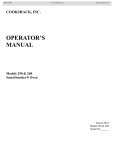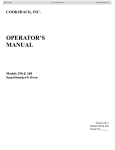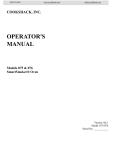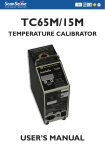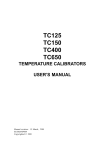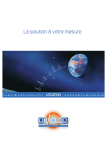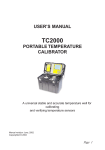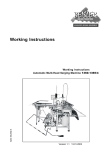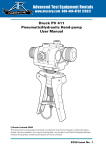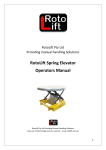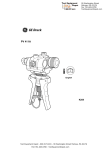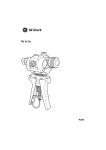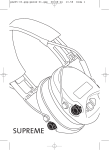Download USER'S MANUAL
Transcript
PM205 PRESSURE CALIBRATOR USER’S MANUAL Thank you for purchasing our pressure meter. This product is manufactured in accordance with our strict standards for quality in design, components, and workmanship to fulfill our vision: “To be the leading company in high quality self-contained products” Scan-Sense AS reserves the right to make improvements or alterations to their products without incurring any responsibility to make the same improvements or alterations to products previously sold. © Scan-Sense AS. All rights reserved. No part of this publications may be reproduced, stored in a retrieval system, or transmitted in any form by any means, electronic, mechanical, photocopying, recording, or otherwise without the prior permission of Scan-Sense AS. All efforts have been made to ensure the accuracy of this handbook. We at Scan-Sense AS are always striving to improve our products and handbooks, therefore we would greatly appreciate being informed of any errors found in our product or its handbook. The above notwithstanding, Scan-Sense AS can assume no responsibility for any errors in this handbook or the consequences. Symbol used to identify an action that can cause personal injury or damage to equipment. Always release internal pressure at connectors before disconnecting. Uncontrolled release of high pressure can result in personal injury and damage to equipment. Scan-Sense AS Bekkeveien 163 N-3173 Vear, Norway Phone: + 47 33 36 30 00 Fax: + 47 33 36 30 01 Email: [email protected] www.scansense.no Table of Contents 1 1.1 1.2 1.3 1.4 1.5 1.6 DESCRIPTION OF THE PM205………………………………………. 1 CALIBRATION LABEL………………………………………………..... 1 CERTIFICATION………………………………………………………... 1 WARRANTY…………………………………………………………….. 2 CONVENTIONS USED IN THIS DOCUMENT……………………… 2 BATTERY CHANGE/ BATTERY LIFE……………………………… 2 PM205 NOT OPERATING/ FAILED ……………………………….. 3 2 2.1 2.2 2.3 2.4 CONTROLS AND INDICATORS………………………………………4 DISPLAY, CONTROLS AND CONNECTIONS……………………… 5 MEASURING PROCEDURE OF THE PEAK-MODE………………. 7 INSTALLATION…………………………………………………………. 7 RANGES/ CALIBRATION ……………………………………………... 7 3 SPECIFICATION OF PM205………………………………………….. 8 4 4.1 4.2 4.3 LTP1, LOW PRESSURE HAND PUMP……………………………....9 LTP1, CONTROLS AND ORIENTATION……………………………..9 OPERATION OF THE LPT1…………………………………………… 10 LTP1 FAULT INVESTIGATION……………………………………….. 11 5 5.1 5.2 5.3 TP1, HAND HELD PRESSURE TEST SYSTEM………………........ 12 TP1 CONTROLS AND ORIENTATION………………………………. 12 OPERATION OF THE TP1…………………………………………….. 13 TP1 FAULT INVESTIGATION………………………………………….14 6 6.1 6.2 HTP1, HYDRAULIC HAND HELD PRESSURE TEST SYSTEM…. 15 HTP1 CONTROLS AND ORIENTATION…………………………….. 16 OPERATIONS OF THE HTP1………………………………………….16 7 7.1 7.2 7.3 7.4 PV411 PNEUMATIC/HYDRAULIC HAND-PUMP SYSTEM………. 18 PV411 CONTROLS AND ORIENTATION………………………….... 19 PV411 PNEUMATIC OPERATION………………………………….... 20 PV411 HYDRAULIC OPERATION………………………….………… 22 PV411 FAULT INVESTIGATION……………………………..………..25 8 PM205 ACCESSORIES……………………………………………….. 26 9 CERTIFICATES………………………………………………………… 28 i 1 DESCRIPTION OF THE PM205 The PM205 Pressure Calibrator has been designed as a self-contained, portable pressure meters that have been calibrated to precision pressure equipment traceable to national standards. Each unit is marked with: • Calibration label, next calibration date • Serial number • Production year • Pressure range. 1.1 CALIBRATION LABEL Scan-Sense AS certifies that this product meets published specifications at the time of shipment from the factory. Scan-Sense AS further certifies that its calibration measurements are traceable to accredited international standards. Each pressure calibrator has a calibrated label showing the last date of calibration and the date when the next calibration is due. Calibration is scheduled annually, unless you believe the unit to be defective, whereupon the unit will be calibrated after repair and receive a new label showing the date calibrated and the new calibration-due date. Check the calibrated label to ensure the Pressure Meter Calibrator has a valid calibration date before using the unit. Calibration must be done by Scan-Sense AS or a certified supplier/service center. 1.2 CERTIFICATION Scan-Sense AS certifies that the PM205 complies with its published list of specifications at the time it was manufactured. Scan-Sense AS also certifies that its calibration measurements are traceable to Norwegian Accreditation and to the calibration facilities of other International Standards Organization (ISO) members. Scan-Sense AS confirms that the PM205 complies with the following standards: Electromagnetic compatibility as established in the guidelines of the European Community, EMC 89/336/EWG . The following norms are applied: EN 61000-6-2, EN 61000-6-3. 1.3 WARRANTY This product is guaranteed free from defects in material and workmanship for one (1) year from the date of shipment. During this 1 warranty period, Scan-Sense AS will, at its option, either repair or replace the PM205 should it prove to be defective. The product must be returned to a service facility designated by Scan-Sense AS for warranty service or repair. The foregoing warranty will not apply to defects resulting from improper maintenance by the purchaser, purchasersupplied software or interfacing, unauthorized modification or misuse, operation exceeding the environmental specifications for the PM205, or improper site preparation. No other warranty is expressed or implied by Scan-Sense AS, and Scan-Sense AS shall not be liable for any direct, indirect, special, incidental or consequential damages, whether based on contract, tort, or any other legal theory. 1.4 CONVENTIONS USED IN THIS DOCUMENT We have provided this section of the Handbook to help you identify noteworthy symbols, terms and conventions used in this handbook. Look for the following: Symbol used to identify an action that can cause personal injury or damage to equipment. Conformité Européenne 1.5 Terms and definitions: We define calibration as being able to compare the ability of the equipment to perform to a known standard. Pressure calibration provides a means of quantifying uncertainties in pressure measurement in order to optimize sensor and/or system accuracy. BATTERY CHANGE/ BATTERY LIFE When the battery starts weakening, a low battery warning (BAT LOW) will appear in the upper left corner of the display. Battery change: Open the instrument (turn the display ring beyond the limit stop). Open the battery compartment and change the battery (type CR2430). Make sure that the O-ring remains embedded in the cover. The battery life is 150 hours in Peak-mode (at continous operation) and 1000 hours in normal measuring mode. * 2 1.6 PM205 NOT OPERATING/FAILED Repairs must be done by manufacturer or supplier certified for service/repair. Replacement parts must be obtained from the manufacturer. Manufacturers address: Phone: + 47 33 36 30 00 Scan-Sense AS Fax: + 47 33 36 30 01 Bekkeveien 163 Email: [email protected] N-3173 Vear, Norway 3 2 CONTROLS AND INDICATORS 2.1 DISPLAY, CONTROLS AND CONNECTIONS The PM205 has two operating keys. The left key (SELECT) serves to select the functions and the pressure units. The right key (ENTER) activates the selected function or pressure unit. The right key is also used to switch between the MAX.- and MIN.-value in both the Manoand Peak-mode. 4 Turn-on: Pressing the SELECT key turns the instrument on. The instrument subsequently displays the software version (year/week), the full-scale pressure range, the actual pressure (top display) and the last measured MAX.-value (bottom display). The instrument has the following functions: RESET: Max.-/Min.-value and Peak-value are set to the actual pressure OFF: Turns off the instrument MANO: Releases the following functions: PEAK off: Normal measuring mode with 2 measurements per second PEAK on: Fast measuring mode with 5000 measurements per second ZERO SEt: Sets a new Zero reference ZERO rES: Sets the Zero to factory setting CONT on: Deactivates the automatic turn-off function CONT off: Activates the automatic turn-off function (the instrument turns off 15 minutes after the last key function)followed by the unit selection: bar, mbar/hPa, kPa, MPa, PSI Example: Setting a new Zero Reference: --> Turn on the instrument by shortly pressing the SELECT-key. --> Wait for the instrument’s measuring mode (approx. 3 seconds). --> Press the SELECT-key 3 times: MANO appears. --> Press ENTER: PEAK on or PEAK off appears. --> Press SELECT: ZERO SEt appears. --> Press ENTER: The new Zero reference is set. The instrument returns to the measuring mode. 5 Display of the Minimum Pressure Value When in the measuring mode (Display: Actual Pressure and Max.value), you may display the Min.-value for 5 seconds by shortly pres sing the ENTER-key. Notes: 1) The functions and units can also be called up by keeping the SELECT-key depressed. Releasing the key enables the displayed function or unit to be activated with the ENTER-key. 2) If the selected function or unit is not activated within 5 seconds with the ENTER-key, PM205 returns to the measuring mode without changing any settings. 3) Turning PM205 on and off does not influence any of the previous settings. 4) If the PEAK on or CONT on function is activated, it is indicated with a flashing sign on the display. 5) If a pressure can not be represented on the display, OFL (overflow) or UFL (underflow) appears on the display. 6) If the actual pressure goes beyond the measuring range, the last valid pressure value starts flashing on the display. 2.2 MEASURING PROCEDURE OF THE PEAK-MODE 6 2.3 INSTALLATION Ref. A) Screw the G “ male port of PM205 into the choosen pressure pump and tighten using the lower hexagon of the transducer. Loosen the upper hexagon and rotate the PM205 to the desired position. Retighten. Ref. Chapter 4 to 7 for further details. Ref. B) The face of the PM205 can be rotated trough 355 Degrees. This feature allows the PM205 to be mounted in all possible positions; vertical, horizontal or upside down. 2.4 RANGES/ CALIBRATION The factory setting of the Zero for the ranges -1…3 bar or -1…30 bar is at 0 bar absolute. For sealed gauge pressure measurements, activate “Zero Set” at ambient pressure. Instruments with ranges >30 bar are calibrated in a sealed gauge mode at ambient pressure. 7 3 SPECIFICATIONS OF PM205 Pressure Ranges, Resolution, Overpressure: Range Resolution Overpressure -1 to 3 bar 1mbar 10 bar -1 to 30 bar 10 mbar 60 bar 0 to 60 bar 10 mbar 120 bar 0 to 300 bar 100 mbar 400 bar 0 to 700 bar 200 mbar 700 bar 0 to 1000 bar 200 mbar 1000 bar Readings per second Zero function Peak function Auto power off Power supply Battery life 5000 (PEAK mode) Yes Max. or Min. 15 min. Battery 1000 hours continous operation MANO-Mode 150 hours of continous operation in PEAK-Mode Litium battery 3.0V size CR2430 Display LCD Selectable read out bar, mbar/hPa, kPa, MPa, PSI, kp/cm2 Standard process coupling ” BSP MALE, Swivel Protection class (EN 60529) IP65 Dimentions 118mm (h) x 42mm (d), ø76mm (w) Weight 0,21 kg Accuracy RT (room temperature) * < 0,1 %FS Total Error Band (0 to 50 °C) < 0,2 % FS Storage-/ Operating Temperature -20 to 70 °C / 0 to 50 °C Compensated Temperature Range 0 to 50 °C 8 4 LTP1, LOW PRESSURE HAND PUMP Provides low pressure of -0,9 to 3 bar. Scan-Sense part no. 3PPM02050 Always release the internal pressure at the connectors before disconnecting. Uncontrolled release of high pressure can result in personal injury and damage to equipment. Do not connect LTP1 to external pressure source! 4.1 LTP1 CONTROLS AND ORIENTATION Drawing key: Pressure-release valve. Fine-adjustment control. Pressure or Vacuum selector. Two push-fit connectors to accept 4mm OD hoses to item under test and PM205 (master instrument). Pressure port: -inch BSP female connector to suit adapters/item under test. Pump handle. Nylon seals (see seal kit provided). DO NOT use PTFE tape for sealing with parallel threads. Pressure-relief valve. 9 RELEASE VALVE Can be used to reduce or release pressure in the system. The rate of pressure reduction is dependent upon the degree of rotation when operating the valve. Minimal force is required to seal the system. FINE-ADJUSTMENT CONTROL The generated pressure can be fine adjusted by turning the fine-adjustment valve either in or out to increase or decrease the pressure. IMPORTANT Do not wind the fine-adjustment valve any further when the top of the pump body is visible. PRESSURE/VACUUM SELECTION Press the selector as indicated on the label to engage the desired mode. Ensure that the release valve is fully closed (clockwise motion) prior to pumping. PRESSURE PORTS The hoses are fitted by pushing them into the connectors until resistance is felt. To remove the hoses, press the collar “in” on the connector while pulling on the hose. PRESSURE RELIEF VALVE The maximum output pressure can be set using the pressure relief valve located inside the main piston, and is accessed via the handle-retaining “Grub Screw”. If the system has not been used for a period of time, it may be difficult to operate on the first stroke. Seal replacement: Depending on the frequency of use, the main piston seal (and others) may need replacing. Replacement seals and instructions for fitting are contained in the seal kit (LTPK1). 4.2 OPERATION OF THE LTP1. Refer to the orientation drawing to locate the controls. 1. Choose the correct adapters and seals and connect to the pressure port at one end of the flexible hoses . 2. Choose the correct adapters and seals and connect the item under test to the pressure port at the end of the second flexible hose Ensure seals are fitted and adapters tightened to a maximum torque of 15Nm. 3. Screw the fine-adjustment valve fully clockwise. 10 4. 5. 6. 7. 8. Screw the fine-adjustment valve counter-clockwise 4 to 6 full turns. Screw the pressure-release valve fully clockwise, tightening to ensure a good seal. Using a small screwdriver, adjust the pressure-relief valve to set the desired maximum output pressure. Turn the “Grub Screw” located in the main piston clockwise to increase or counterclockwise to decrease the pressure setting. Operate the handle until the pressure is close to that which is finally required. Wind the fine-adjustment valve “in” to increase pressure or “out” to decrease pressure until the required pressure is reached. After increasing the pressure, it may take up to 30 seconds for the pressure to settle due to thermodynamic effects, setting of seals or expansion of the flexible hose. STOP unscrewing the fine-adjustment valve when the top of the pump body becomes visible! 9. Reductions in pressure can also be achieved by careful use of the pressure-release valve . 10. Vacuum is achieved using the above procedure and having the changeover valve pushed completely towards the vacuum position. 11. End of operation procedure. 4.3 LTP1 FAULT INVESTIGATION In the event that the system appears to lose pressure, check the connections to ensure that they are tight and the seals are good. Replace poor seals and repeat the operation. When testing for leaks you may notice that air is drawn in or expelled from around the changeover valve , this is normal and should not be a cause for concern. Connection to the handheld test system is sealed with “o”-ring or bonded seals and should not leak. The pipe or body connection can be checked but should not be tightened more than 2 Nm. DO NOT attempt to tighten the other fittings to the test system as this can cause damage to the sealed joints! 11 5 TP1, HAND HELD PRESSURE TEST SYSTEM Provides pneumatic pressure of -0,8 to 40 bar. Scan-Sense part no. 3PPM40050 Always release internal pressure at connectors before disconnecting. Uncontrolled release of high pressure can result in personal injury and damage to equipment. Do not connect TP1 to external pressure source! 5.1 TP1 CONTROLS AND ORIENTATION Drawing key: 3/8-inch to -inch BSP connector for PM205 (master instrument). Fine-adjustment valve (volume control). Pressure-release valve Pressure or Vacuum selector. Adjustable stroke for varying maximum pressure output. Pressure port: -inch BSP female connector to suit adapters/item under test. Flexible hose to item under test. Nylon seals (see seal kit provided). DO NOT use PTFE tape for sealing with parallel threads. 12 RELEASE VALVE Can be used to reduce or release pressure in the system. The rate of pressure reduction is dependent upon the degree of rotation when operating the valve. Minimal force is required to seal the system. VOLUME CONTROL The generated pressure can be fineadjusted by turning the fine-adjustment valve either clockwise or counter-clockwise to increase or decrease the pressure accordingly. IMPORTANT Under no circumstances should the fine-adjust valve be wound back beyond the read-line indicator on the body. Should this occur, then the pressure must be released from the system before attempting to re-engage the fine-adjustment valve. OVER PRESSURE PROTECTION To adjust the maximum output pressure of the system, turn the nuts to increase or decrease the stroke length. PRESSURE/VACUUM SELECTION Press the selector as indicated on the label to engage the desired mode. Ensure that the release valve is fully closed (use a clockwise motion) prior to pumping. If the system has not been used for a period of time, it may be difficult to operate on the first stroke. The cylinder has been lightly greased at assembly, but if additional lubrication is ever required, apply a minimal amount to the inside of the cylinder. Access is via the three retaining screws located under the black collar. Seal replacement: Depending on the frequency of use, the main piston seal (and others) may need replacing. Replacement seals and instructions for fitting are contained in the seal kit (TPK1). 5.2 OPERATION OF THE TP1 Refer to the orientation drawing to locate the controls. 1. Choose the correct adapters and seals and connect item under test to pressure port at the end of the flexible hose . Ensure seals are fitted and adapters tightened to a maximum torque of 15Nm. 2. Screw the fine-adjustment valve fully clockwise. 3. Screw the fine-adjustment valve counter-clockwise 4 to 6 full turns. 13 4. 5. 6. Screw the pressure-release valve fully clockwise, tightening to ensure a good seal. Operate handles until the pressure is close to that which is finally required. Ensure handles are fully squeezed together on each stroke to achieve maximum pressure output. Wind the fine-adjustment valve (clockwise to increase pressure or counter-clockwise to decrease pressure) until the required pressure is reached. After increasing the pressure, it may take up to 1 minute for the pressure to settle due to thermodynamic effects, setting of seals or expansion of the flexible hose. NEVER screw the fine-adjustment valve beyond the red line indicator! 7. 8. 9. 5.3 Reductions in pressure can also be achieved by careful use of the pressure release valve . Vacuum is achieved using the above procedure and having the changeover valve pushed completely towards the vacuum position. End of operation procedure. TP1 FAULT INVESTIGATION In event that the system appears to lose pressure, check the connections to ensure they are tight and the seals are good. Replace poor seals and repeat the operation. When testing for leaks you may be notice that air is drawn in or expelled from around the changeover valve , this is normal and should not be a cause for concern Connection to the handheld test system is sealed with “o”-ring or bonded seals and should not leak. The pipe or body connection can be checked but should not be tightened more than 2 Nm. DO NOT attempt to tighten the other fittings to the test system as this can cause damage to the sealed joints! 14 6 HTP1, HYDRAULIC HAND HELD PRESSURE TEST SYSTEM Provides hydraulic pressure of 0 to 700 bar Scan-Sense part no. 3PPM70150 Always release the internal pressure at the connectors before disconnecting. Uncontrolled release of high pressure can result in personal injury and damage to equipment. Excessive pressure can crack or break the fluid reservoir case! Reservoir fluid level: If the fluid level in the reservoir falls considerably during use, a partial vacuum may be created in the reservoir that can affect the performance of the pump. To avoid this, simply allow air to enter the reservoir by partly unscrewing the filling plug. Seal replacement: Depending on the frequency of use, the main piston seal (and others) may need replacing. Replacement seals and instructions for fitting are contained in the seal kit (HTPK1). 6.1 HPT1 CONTROLS AND ORIENTATION Drawing key: 3/8-inch to -inch BSP connector for PM205 (master instrument). 15 Pressure-release valve. Fine control Pressure port: M16 x 1.5 mm quick connector for flexible hose to switch adapters or item under test. 100cc reservoir. Fluid level to maximum fill marker. Reserve-filling plug. Prime/High pressure selector. Fluid-inlet tube. Rear port: for Pressure Relief Valve ONLY. DO NOT use for any other purpose. 6.2 OPERATION OF THE HTP1 Refer to the orientation drawing to locate the controls. 1. Remove the filling plug and fill the reservoir to 6mm level with the recommended fluid and replace the filling plug. 2. Connect the instrument under test to the flexible hose/gauge adapter and attach to the pump via the quick-fit connection . 3. Adjust the fine control to mid-travel. 4. Ensure that the pressure-release valve is open (turn fully clockwise, then one turn counter-clockwise). Fully squeeze the handles “in” and turn the selector to the “prime” position. 5. Operate the handles several times to expel air from the pump (ensure that the fluid-inlet tube remains immersed in fluid at all times). 6. Close the release valve fully clockwise. 7. Prime the system by squeezing the handles together and then releasing them, to allow the oil to enter the pump cylinder. Repeat as necessary until the system is fully primed and low pressure is indicated on either the master or test instrument. 8. With the handles fully squeezed “in” select the “high” pressure position on the selector and operate the handles to generate approximate pressure. Note: Smaller handle strokes enable easier pressure generation at high pressures. 9. Adjust pressure to the required value using the fine control . Note that the pressure will fall slightly, immediately after pressure generation due to the thermodynamic effect but will stabilize after a short time. DO NOT EXCEED the maximum operating pressure indicated on the pump label! Fluid reservoir can crack or break if excess pressure applied. 16 10. To totally release pressure from the system, turn the release valve one turn counterclockwise and select the “prime” position on the selector after first squeezing the handles fully “in”. Note: Careful use of the release valve and fine control enables a controlled release of pressure, essential for calibration purposes. 11. End of operation procedure. 17 7 PV411 PNEUMATIC/HYDRAULIC HAND-PUMP SYSTEM Pressure ranges (maximum safe working pressure is 700 bar): • • • Provides pneumatic pressure of 0 to 60 bar 0 to –0.95 bar (near vacuum) Scan-Sense part no. 5PV-411 Provides hydraulic pressure of 0 to 700 bar Scan-Sense part no. 5PV-411-115 Always release the internal pressure at the connectors before disconnecting. Uncontrolled release of high pressure can result in personal injury and damage to the equipment. Reservoir-fluid level: If the fluid level in the reservoir falls considerably during use, a partial vacuum may be created in the reservoir that can affect the performance of the pump. To avoid this, simply allow air to enter the reservoir by partly unscrewing the filling plug. Hydraulic fluids must be compatible with stainless steel, anodized aluminum, nitrile rubber, PTFE, polypropylene, delrin, acrylic and nylon. Hydraulic fluid must have a maximum viscosity of 150 cSt at 40°C. Other fluids that can be used are de-mineralized water or mineral-based oils (SAE 40W, ISO viscosity grade 150). Seal replacement: Depending on frequency of use, the main piston seal (and others) may need replacing. Replacement seals and instructions for fitting are contained in the seal kit (PV411K1). 18 7.1 PV411 CONTROLS AND ORIENTATION PV411, drawing key 1 Drawing key 1: Inlet (reservoir) port -inch to -inch BSP connector for PM305 (master instrument) Volume adjuster Limit adjuster Scissor-action handles Pressure port: M16 x 1.5 mm quick connector for flexible hose to suit adapters and item under test. Selector valve Pressure-relief valve 19 7.2 7.2.1 PV411 PNEUMATIC OPERATION Pneumatic-selector valve and scissor-action handles limitadjuster of the PV411 Selector valve Pressure Turn the selector valve fully clockwise (“in”) position. Vacuum Turn the selector valve fully counterclockwise (“out”) position. Vent Slowly turn the selector valve to the center position. Scissor-action handles limit-adjuster Turning the limit adjuster clockwise reduces the stroke of the scissor-action handles . Turning the limit adjuster counter-clockwise increases the stroke. For maximum pneumatic pressure generation, turn the limit adjuster fully counter-clockwise. 7.2.2 Pneumatic Operation of the PV411 As a pneumatic pump, selector valve vents the system to atmosphere, between selection of pressure and vacuum. Operating the scissor-action handles provides the pumping stroke for generating pressure. A volume adjuster allows small adjustments of the system pressure. In pressure mode, air/fluid is drawn through the inlet port on top of the pump and forced out through the two outlet ports ( and ). In vacuum mode, the air/fluid flow is reversed as air/fluid is drawn in through the top and rear outlet ports ( and ) and expelled through the inlet port . Volume adjuster 20 Low pressure__ With the selector valve set to vent (“open”), turn the volume adjuster fully counter-clockwise to the “out” position. Turn the selector valve fully clockwise to the “in” position to select pressure. Turn the volume adjuster clockwise to generate pressure. High pressure _ Turn the volume adjuster to the mid-position. In this position, fine adjustments of the generated pressure can be made. Using the scissor-action handles , generate the approximate pressure; then turn the volume adjuster clockwise to the “in” position to increase the pressure or turn the volume adjuster counter-clockwise to the “out” position to decrease the pressure. Vacuum ______ Turn the selector valve fully counter-clockwise to the “out” position. Turn the volume adjuster to the mid-position. In this position, fine adjustments of the generated vacuum can be made. Using the scissoraction handles , generate the approximate pressure; then turn the volume adjuster clockwise to the “in” position to increase the pressure or turn the volume adjuster counter-clockwise to the “out” position to decrease the pressure. Refer to the orientation drawing to locate the controls. Pressure 1. Connect the PV411 to the item under test using the hoses, pipes and adapters. 2. Turn the selector valve fully clockwise to the “in” position. 3. Operate the scissor-action handles to generate the approximate pressure, allowing time for thermal stabilization. 4. If necessary, use the volume adjuster to adjust to the required pressure. 5. After attaining the required pressure, operate the scissor-action handles to generate a higher pressure. Alternatively, vent pressure to atmosphere by slowly turning the selector valve counter-clockwise to the center position. 6. End of procedure. Depressurize the pump and disconnect from the pipes and equipment. Vacuum 1. Connect the PV411 to the item under test using the hoses, pipes and adapters. 21 2. Turn the selector valve fully counter-clockwise to the “out” position. 3. Operate the scissor-action handles to generate the approximate vacuum, allowing time for thermal stabilization. 4. If necessary, use the volume adjuster to adjust to the required vacuum. 5. After attaining the required vacuum, operate the scissor-action handles to generate more vacuum. Alternatively, vent vacuum to atmosphere by slowly turning the selector valve counterclockwise to the center position. 6. End of procedure. Depressurize the pump and disconnect. 7.3 PV411 HYDRAULIC OPERATION 7.3.1 Setting pressure relief valve of the PV411 The pressure relief valve (PRV) can be set at pressures from 30 to 700 bar. Do not exceed 700 bar as this can damage the internal seals of the PRV and the PV411 If the system pressure exceeds the set pressure, the PRV opens and vents fluid through the inlet port to the reservoir. When system pressure decreases below the set pressure, the PRV closes. Drawing key 3: PRV locking screw (quantity 2). PRV locknut (with left-hand thread). PRV adjusting nut (with left-hand thread) PRV, drawing key 3 Refer to the orientation drawing PRV411 drawing key 1 and PRV drawing key 3 to locate the controls. 1. Connect a suitable pressure indicator to either outlet port or (see PRV411, drawing key 1). Fit a blank to the unused port. 2. Squeeze the scissor-handles together to increase pressure until the relief valve operates. 3. Loosen the two PRV locking screws . 4. Loosen the locking nut by turning it clockwise. 5. Set the relief pressure by turning the PRV adjusting nut . Turn counter-clockwise to increase pressure. Turn clockwise to decrease pressure. 6. After setting the PRV, hold the adjusting nut in position and tighten the locking nut . Remember that the locking nut has a left-hand thread. 7. Check operation of the PRV. If necessary, reset the PRV. 22 8. Secure the locking nut by tightening the two locking screws . 9. End of procedure. 7.3.2 Hydraulic Operation of the PV411 As a hydraulic pump, selector valve vents the system to the reservoir, between selections of pressure and vacuum (using a priming process). The volume adjuster generates the required system pressure. To complete the hydraulic circuit, the fluid reservoir (see drawing key 2) is screwed into the inlet port (marked RESERVOIR) on top of the hand-pump. A pressure relief valve can be adjusted to set the pressure between 30 and 70 bar. Operating the scissoraction handles provides the pumping stroke for generating pressure. A volume adjuster allows small adjustments of the system pressure. The fluid-reservoir body (see drawing key 2) is transparent acrylic to provide a clear view of the contents. The reservoir can be removed from the pump without the need to empty the fluid (a self-sealing connection prevents leakage). The spring-loaded reservoir cover seals under atmospheric pressure conditions but, in the event of inadvertent pressurization, it will vent excess internal pressure harmlessly. Ensure that the O-ring is fitted to the inlet pot to prevent leakage. Screw the reservoir clockwise into the inlet port marked RESERVOIR. Drawing key 2: Reservoir-cover locknut. Reservoir-cover. O-ring. Bleed hole. • • • • • Do not mix hydraulic fluids. Use only compatible fluids. Fit only appropriate seals. Damage can be caused if equipment connected to this pump is contaminated. Avoid particulate contamination. After use, the pump should be considered contaminated with hydraulic fluid. Reservoir, drawing key 2 Filling the reservoir Unscrew the reservoir cover lock and remove the reservoir cover . Using clean recommended fluid, fill the reservoir to approximately 23 2/3 full. Refit the reservoir cover and re-tighten the reservoir locknut . Connect the required pipes and equipment to the outlet ports. Priming the system There are two methods for priming the system: • Vacuum priming to extract the air or • Pre-filing the system. 1. If air remains in the system, full pressure cannot be achieved because the air in the fluid will compress. Air must be removed from the system fluid. 2. Both priming methods require the pump to be held in the vertical position to keep the reservoir bleed hole submerged in the fluid. Do not allow air to enter the system through the bleed hole . Vacuum priming This method should not be used with vacuum-sensitive equipment. 1. 2. 3. 4. 5. Connect the PV411 to the item under test using the hoses, pipes and adaptors. Turn the selector valve fully counter-clockwise to the “out” position. Operate the scissor-action handles until bubbles stop appearing in the reservoir (this generates the vacuum in the system). Turn the selector valve fully clockwise to the “in” position (this action releases the vacuum and rapidly fills the system with fluid from the reservoir). End of procedure. The pump and connected system are ready for use. Pre-filling the system 1. Connect the PV411 to the item under test using the hoses, pipes and adaptors. 2. Turn the selector valve fully clockwise to the “in” position. 3. Loosen the reservoir-cover lock to open the reservoir cover and allow atmospheric pressure into the top of the reservoir. 4. Open the bleed valve on the unit under test. 5. Carefully operate the scissor-action handles to fill the system. Stop pumping when fluid comes out of the bleed valve. 6. Close the bleed valve on the unit under test. 7. If necessary, top-up the reservoir to the 2/3 full level. 24 8. 9. Refit and secure (tighten) the reservoir cover and re-tighten the reservoir locknut . End of procedure. The pump and connected system are ready for use. Hydraulic Operation of the PV411 Refer to the orientation drawing to locate the controls. 1. Connect the PV411 to the item under test using the hoses, pipes and adaptors. 2. Open the selector valve by 1 turn counter-clockwise to the “in” position. 3. Screw the volume adjuster fully counter-clockwise to the “out” position. 4. Close the selector valve . 5. Operate the scissors-action handles to generate the initial pressure. 6. Turn the volume adjuster clockwise to generate the required pressure. Allow time for thermal stabilization. 7. To reduce pressure, turn the volume adjuster counterclockwise (the “out” position) to the required pressure. 8. After completion, turn the volume adjuster counter-clockwise (the “out” position) and the selector valve to the center position to depressurize the pump. 9. End of procedure. Depressurize the pump and disconnect from the pipes and equipment. 7.4 PV411 FAULT INVESTIGATION If the system pressure reduces, check the following: Refer to the orientation drawing PV411 drawing key 1 to locate the controls. 1. Check that the selector valve is in the correct position and properly tightened. 2. Allow sufficient time after generating pressure for the temperature to stabilize. The larger the system volume, the longer the time for thermal stability. 3. Check for leaks between the pump and the equipment under test and the adaptors, flexible pipe and connections. Tighten any loose joints and replace any seals that are worn or damaged. 4. In hydraulic mode, if the volume adjuster can be wound fully in, but maximum pressure cannot be achieved, there is probably air trapped in the system. Re-prime and repeat. 5. Check the Pressure-Relief Valve pressure setting. 25 If, for any reason, a fault occurs within the pump, it is recommended that the equipment be returned to Scan-Sense AS. 8 PM205 ACCESSORIES 8.1 ADAPTERS FOR THE ITEM UNDER TEST Adapter kit 1, -inch BSP to NPT Female, Carbon Steel Description drawing 1/4" BSP male – 1/8" NPT female 1/4" BSP male – 1/4" NPT female 1/4" BSP male – 3/8" NPT female 1/4" BSP male – 1/2" NPT female Adapter kit 2, -inch BSP to BSP Female, Carbon Steel Description drawing 1/4" BSP male –- 1/8" BSP female 1/4" BSP male – 3/8" BSP female 1/4" BSP male – 1/2" BSP female 26 Adapter kit 4 BSP-BSP Swivel, Carbon Steel 1/4" BSP male – 3/8" BSP male for LPT1 and TP1. Test hose kit 700 bar, Carbon Steel 1/4" BSP male – 1/4" BSP male for HTP1, PV411 and PC705; connects to M16 x1.5mm quick connector at pump and to item with M16 x 1.5mm with ” BSP female adapter. 27 9 CERTIFICATES 28 PM205 User’s Manual Rev. 01-2009 MANP205 Copyrighted © 2009 Scan-Sense AS

































